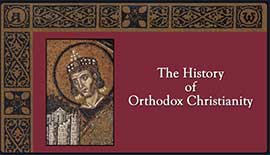ORTHODOX PATRIARCH JEREMIAS II REJECTED COMPROMISE WITH LUTHERANS
NEARLY SIXTY YEARS after Luther posted his 95 Theses, setting in motion the events that led to the Reformation, Lutherans contacted leaders of the Eastern Orthodox Church in 1573 to see if union could be achieved. Stephen Gerlach, a notable Lutheran scholar, delivered their first letter to Ecumenical Patriarch Jeremias II. He wrote home that Jeremias had received him pleasantly.
When Martin Crusius, Tubingen’s professor of Greek and Latin, heard this, he wrote again immediately. After considerable delay, Jeremias replied in a letter and would write several more. Meanwhile the Lutherans had sent the Patriarch a copy of the Augsburg Confession, a major statement of Lutheran faith translated into Greek by Melanchthon.
Jeremias and several of his colleagues studied the twenty-one points of the Augsburg Confession and formulated a careful reply. Called Epicrisis on the Confession of Augsburg, it was dated this day, 15 May 1576. (Epicrisis can be translated Comments.) While agreeing with some Lutheran positions, the Orthodox rejected others.
Key among the areas on which they disagreed was the role of tradition. The Orthodox hold that sacred Tradition and the rulings of ecumenical church councils stand beside God’s word as sources of truth. Lutherans believed that tradition and the rulings of councils are only to be followed when they have solid grounding in Scripture. In the Epicrisis, Jeremias wrote,
Let no one undertake or think anything contrary to the decisions of the Holy Apostles and the Holy Synods. … What communion would one have with us, who rejects the aforementioned canons and opposes the Apostles and shamelessly turns himself against the Holy Apostles? What part could he have with us?
Lutherans and Orthodox also diverged from each other on the issue of the filoque clause (“from the son”) that the Western church had added to the Nicene Creed without consulting their Eastern brethren. This clause teaches that the Spirit proceeds from both the Father and the Son. The Orthodox firmly rejected this as an innovation on historical and biblical grounds.
In their correspondence, the Orthodox also rejected the Lutheran view of the human will. They upheld prayer to the saints, veneration of icons, prayers for the dead, and insisted there were more than just the two sacraments that the Lutherans accepted—Baptism and the Lord’s Supper.
When Jeremias saw that union was out of the question, he ended the exchange of letters: “Go your own way, and do not write any more on doctrinal matters; and if you do write, write only for friendship's sake.”
—Dan Graves
----- ----- -----
The History of Orthodox Christianity is an in-depth look at the history and distinctive beliefs of the Orthodox Church. Watch it at RedeemTV.
The History of Orthodox Christianity can be purchased at Vision Video.







